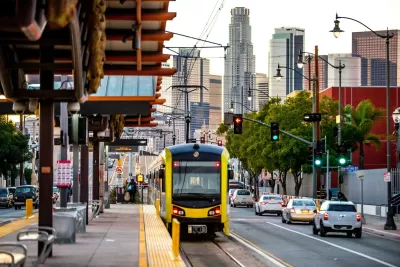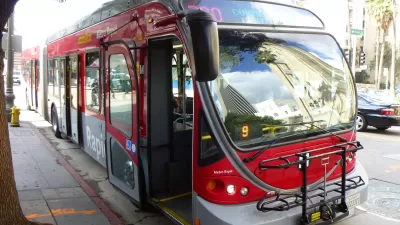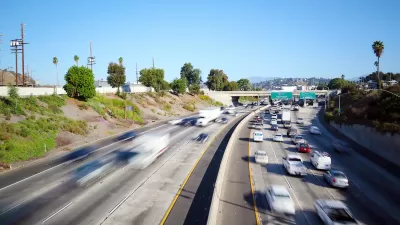The program issued ‘mobility wallets’ to 1,000 residents who took over 67,000 trips.

A one-year ‘universal basic mobility’ pilot project in Los Angeles is nearing its close, writes Maylin Tu in Next City, offering a model for how cities can improve mobility for low-income transit users, boost ridership, and reduce emissions.
Other cities have experimented with the concept of ‘transit wallets’ that give residents a fixed subsidy that can be used for any transit service or product (for example, recipients can save unused funds over several months to use toward purchasing an e-bike). In Los Angeles, the pilot program included 1,000 South Los Angeles residents.
“In addition to the mobility wallet, the pilot includes an e-bike lending library, an expansion of BlueLA, an electric vehicle car-share program and the installation of electric vehicle charging stations, among other initiatives.” Future phases will expand the program to another 2,600 residents from South L.A. and Los Angeles County, and Metro is working to secure federal funding for the program’s future expansion.
While the majority of trips using the program were taken on public transit, participants spent the most funds on ride-hailing and taxi services (likely because of their higher cost). “According to Metro, participants are taking the bus or train during normal commute times and taking ride-hailing services early in the morning or late at night, indicating that participants are using options like Uber and Lyft when transit options are less available.”
FULL STORY: America’s Biggest Universal Basic Mobility Experiment Is Taking Place in L.A.

Manufactured Crisis: Losing the Nation’s Largest Source of Unsubsidized Affordable Housing
Manufactured housing communities have long been an affordable housing option for millions of people living in the U.S., but that affordability is disappearing rapidly. How did we get here?

Americans May Be Stuck — But Why?
Americans are moving a lot less than they once did, and that is a problem. While Yoni Applebaum, in his highly-publicized article Stuck, gets the reasons badly wrong, it's still important to ask: why are we moving so much less than before?

Using Old Oil and Gas Wells for Green Energy Storage
Penn State researchers have found that repurposing abandoned oil and gas wells for geothermal-assisted compressed-air energy storage can boost efficiency, reduce environmental risks, and support clean energy and job transitions.

Greening Oakland’s School Grounds
With help from community partners like the Trust for Public Land, Oakland Unified School District is turning barren, asphalt-covered schoolyards into vibrant, green spaces that support outdoor learning, play, and student well-being.

California Governor Suspends CEQA Reviews for Utilities in Fire Areas
Utility restoration efforts in areas affected by the January wildfires in Los Angeles will be exempt from environmental regulations to speed up the rebuilding of essential infrastructure.

Native American Communities Prepare to Lead on Environmental Stewardship
In the face of federal threats to public lands and conservation efforts, indigenous groups continue to model nature-centered conservation efforts.
Urban Design for Planners 1: Software Tools
This six-course series explores essential urban design concepts using open source software and equips planners with the tools they need to participate fully in the urban design process.
Planning for Universal Design
Learn the tools for implementing Universal Design in planning regulations.
Heyer Gruel & Associates PA
City of Moreno Valley
Institute for Housing and Urban Development Studies (IHS)
City of Grandview
Harvard GSD Executive Education
Salt Lake City
NYU Wagner Graduate School of Public Service
City of Cambridge, Maryland





























